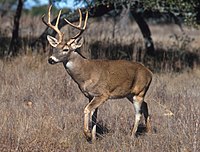
Breeding behavior of female white‐tailed deer relative to conception: Evidence for female mate choice
Sign Up to like & getrecommendations! Published in 2017 at "Ecology and Evolution"
DOI: 10.1002/ece3.2845
Abstract: Abstract Female white‐tailed deer (Odocoileus virginianus) are thought to choose between two behavioral strategies to maximize the quality of potential mates: sit and wait, characterized by concentrating activity within a restricted area, and excursive behavior,… read more here.
Keywords: deer; conception; white tailed; tailed deer ... See more keywords

Addressing regional relationships between white‐tailed deer densities and land classes
Sign Up to like & getrecommendations! Published in 2021 at "Ecology and Evolution"
DOI: 10.1002/ece3.8084
Abstract: Abstract White‐tailed deer (Odocoileus virginianus) populations have recovered to about 30 million animals in the United States, but land cover has changed during the interval of recovery. To address the relationship between deer densities and… read more here.
Keywords: deer; white tailed; woody wetlands; tailed deer ... See more keywords

White‐tailed deer exploit temporal refuge from multi‐predator and human risks on roads
Sign Up to like & getrecommendations! Published in 2022 at "Ecology and Evolution"
DOI: 10.1002/ece3.9125
Abstract: Abstract Although most prey have multiple predator species, few studies have quantified how prey respond to the temporal niches of multiple predators which pose different levels of danger. For example, intraspecific variation in diel activity… read more here.
Keywords: deer; white tailed; tailed deer; predator ... See more keywords

Spatiotemporal patterns of male and female white‐tailed deer on a hunted landscape
Sign Up to like & getrecommendations! Published in 2022 at "Ecology and Evolution"
DOI: 10.1002/ece3.9277
Abstract: Abstract Resource selection in sexually dimorphic ungulates is at least partially explained by sex‐specific resource requirements and risk aversion strategies. Females generally spend more time in areas with less risk and abundant, high‐quality forage due… read more here.
Keywords: deer; white tailed; tailed deer; male female ... See more keywords

Density‐habitat relationships of white‐tailed deer (Odocoileus virginianus) in Finland
Sign Up to like & getrecommendations! Published in 2022 at "Ecology and Evolution"
DOI: 10.1002/ece3.9711
Abstract: Abstract In heterogeneous landscapes, resource selection constitutes a crucial link between landscape and population‐level processes such as density. We conducted a non‐invasive genetic study of white‐tailed deer in southern Finland in 2016 and 2017 using… read more here.
Keywords: density; deer; finland; white tailed ... See more keywords

A phenology of fear: Investigating scale and seasonality in predator-prey games between wolves and white-tailed deer.
Sign Up to like & getrecommendations! Published in 2023 at "Ecology"
DOI: 10.1002/ecy.4019
Abstract: Predators and prey engage in games where each player must counter the moves of the other, and these games include multiple phases operating at different spatiotemporal scales. Recent work has highlighted potential issues related to… read more here.
Keywords: white tailed; tailed deer; phenology; predator ... See more keywords

Effect of activity states on habitat selection by black‐tailed deer
Sign Up to like & getrecommendations! Published in 2018 at "Journal of Wildlife Management"
DOI: 10.1002/jwmg.21529
Abstract: Habitat selection is a complex hierarchical process and in ungulates typically varies at broad spatial and temporal scales and among individuals. Recent advancements in the ability of global positioning system (GPS)-collars to collect activity data… read more here.
Keywords: tailed deer; habitat selection; activity states; selection ... See more keywords

Effects of breeding chronology on white‐tailed deer productivity in Alabama
Sign Up to like & getrecommendations! Published in 2019 at "Wildlife Society Bulletin"
DOI: 10.1002/wsb.1031
Abstract: Following declines in white‐tailed deer (Odocoileus virginianus) populations during the 19th century, many areas throughout the southeastern United States were restocked from various sources. As a result, some populations remain genetically distinct, and phenotypic traits… read more here.
Keywords: deer; white tailed; productivity; tailed deer ... See more keywords

Intestinal Microbial Community Dynamics of White-Tailed Deer (Odocoileus virginianus) in an Agroecosystem
Sign Up to like & getrecommendations! Published in 2017 at "Microbial Ecology"
DOI: 10.1007/s00248-017-0961-7
Abstract: The intestinal microbiota has important functions that contribute to host health. The compositional dynamics of microbial communities are affected by many factors, including diet and presence of pathogens. In contrast to humans and domestic mammals,… read more here.
Keywords: odocoileus virginianus; white tailed; deer odocoileus; tailed deer ... See more keywords

Characterization of mule deerpox virus in Florida white-tailed deer fawns expands the known host and geographic range of this emerging pathogen
Sign Up to like & getrecommendations! Published in 2018 at "Archives of Virology"
DOI: 10.1007/s00705-018-3991-7
Abstract: Infections caused by mule deerpox virus (MDPV) have been sporadically reported in North American cervids. White-tailed deer (Odocoileus virginianus) fawns from a farm located in South Central Florida presented with ulcerative and crusting lesions on… read more here.
Keywords: white tailed; deerpox virus; microscopy; tailed deer ... See more keywords

Setting an evolutionary trap: could the hider strategy be maladaptive for white-tailed deer?
Sign Up to like & getrecommendations! Published in 2017 at "Journal of Ethology"
DOI: 10.1007/s10164-017-0514-z
Abstract: An evolutionary trap occurs when an organism makes a formerly adaptive decision that now results in a maladaptive outcome. Such traps can be induced by anthropogenic environmental changes, with nonnative species introductions being a leading… read more here.
Keywords: hider strategy; tailed deer; white tailed; evolutionary trap ... See more keywords